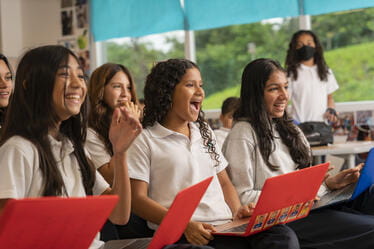Raising children across cultures is a unique journey. Third-culture kids, those who grow up in a culture different from their parents, often develop remarkable adaptability, multilingual skills, and global awareness. But they also face challenges: identity questions, frequent transitions, and the need to constantly adjust.
At the Metropolitan School of Panama (MET), we’ve seen how the International Baccalaureate (IB) Continuum provides the structure, support, and mindset that help these students thrive. With a consistent educational philosophy from early years to graduation, the IB empowers third-culture kids to grow with confidence and purpose.
1. The IB encourages self-reflection and identity building Third-culture kids often navigate questions like Where do I belong? or What defines me? The IB curriculum places strong emphasis on personal reflection, cultural understanding, and global citizenship. Students are encouraged to explore who they are, where they come from, and how they relate to others, building a strong sense of identity in a multicultural world.
At the MET, this begins in the Primary Years Programme (PYP), where students explore themes like “Who We Are,” and continues through the Middle Years Programme (MYP) and Diploma Programme (DP), where learners engage with complex global and personal topics.
2. It fosters adaptability with purpose
While third-culture kids often adapt quickly, the IB helps them do so with intention. Inquiry-based learning teaches students to ask questions, evaluate perspectives, and make informed decisions. This empowers them to navigate change without losing their sense of self.
Throughout the IB Continuum, students learn to embrace challenges, reflect on their experiences, and grow from them, skills that are essential for life across cultures.
3. It connects students to a global learning community The IB is recognized worldwide and designed to be transferable across countries. For families who relocate frequently, this continuity provides stability. More importantly, it connects students to a global network of learners who share similar experiences and values.
At the MET, students engage in service learning, intercultural projects, and collaborative activities that help them feel part of something bigger, no matter where they come from.
4. It prepares them for future transitions Whether a student stays in Panama or moves again, the IB equips them with academic rigor, emotional resilience, and practical skills. The Diploma Programme (DP) prepares students for university and life beyond school, with a focus on time management, research, and independent thinking.
For third-culture kids, this means they’re not just ready for the next move, they’re ready to lead wherever they go.
5. It creates a sense of belonging through international mindedness At the MET, third-culture kids are part of a diverse and internationally minded community. With over 45 nationalities represented, students learn in an environment that values global perspectives and cultural exchange. Through shared experiences, school-wide events, and inclusive classroom practices, the MET creates spaces where every student feels they belong.
Want to learn more about how the MET supports third-culture families?
Book a tour /
Contact Admissions.jpg?h=499&iar=0&w=887&rev=68b26609304747dd9794abc2b063eecb&hash=1F302CF353FA03FC10BB7455DF4CF9DB)
